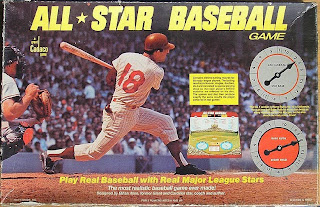All Star Baseball
 It's only a few days before pitchers and catchers report for spring training, so it's time to think about baseball again. I had occasion to yesterday when I read that Strat-O-Matic Baseball, the most popular baseball simulation game, had its fiftieth anniversary.
It's only a few days before pitchers and catchers report for spring training, so it's time to think about baseball again. I had occasion to yesterday when I read that Strat-O-Matic Baseball, the most popular baseball simulation game, had its fiftieth anniversary.I've only played Strat-O-Matic once. When I was briefly employed at Crescent Publications (they publish High Society, Cheri, and other fine stroke mags) I had a colleague named Vin who was a delight. He took it into his head that we would play Strat-O-Matic on our lunch hour. I went with him to The Compleat Strategist, a game store in New York City, to buy a copy. We played exactly one game.
The game I spent my youth playing was Ethan Allen's All Star Baseball, which was far less realistic but perfect for younger kids. From the age of twelve to about fifteen I wore my set out, playing complete seasons, keeping track of all the stats.
The game, which was invented in the 1940s by an ex-ballplayer (not the revolutionary leader of the Green Mountain Boys) was imperfect, to say the least. For one thing it did not take into account pitching or defense. The premise was simple: each batter was represented by a cardboard disc, which was inserted into a slot on the gameboard. The card was ringed with numbers, each one representing an outcome, and the width of those pie slices varied by the players' reputation. Babe Ruth, for example, had a very fat "1" (which was a home run). You flicked the spinner and moved pegs on the board to represent the runners.
Strat-O-Matic's innovation was adding an outcome based on pitching and defense. I remember playing All Star Baseball games and if a pitcher got in trouble I'd remove him, though it made absolutely no difference. The game also had no provision for injuries, so I had a four-man starting rotation and they each had 40 starts. That never happen in real life.
I can still remember the sound that spinner made, and how the gameboard was a representation of Wrigley Field (you put up a cardboard scoreboard, which was a photo of Wrigley's scoreboard). I must have gotten the game as a gift, and I don't know of a present my parents got me that I made more use of. My brother also played games on it, though, oddly, we rarely played each other.
I got the game in the early seventies, and the players represented were already on their decline, if not out of the league outright. I don't remember who they were, but for some reason I remember their was a card representing the now long-forgotten Ted Uhlaender. Sometime in the late seventies I bought a set of new cards, which was like discovering a new wonderful flavor of ice cream. There were also old-time players in there, like Ruth.
I may have played the game longer than I want to remember--maybe even up through the end of high school. If I would have a Strat-O-Matic set I would have played that, too, but in a certain way I'm glad I never had one, because I would have probably been obsessed with it. In the mid-80s I got a game that is very similar in design, called Pursue the Pennant, and played that for a while, keeping stats like some sort of geek.
My last foray into this sort of world came by playing fantasy baseball, which I did for a while into the late 90s. I finally quit, out of lack of money and patience (to really play that well, you have to know almost every player, and assiduously check box scores). In some ways I miss it, in some ways I don't, as I kind of felt free when I stopped doing it. Now I can enjoy baseball without feeling trapped by it. I have never owned a computer baseball game, either. Maybe when I retire.


Comments
Post a Comment